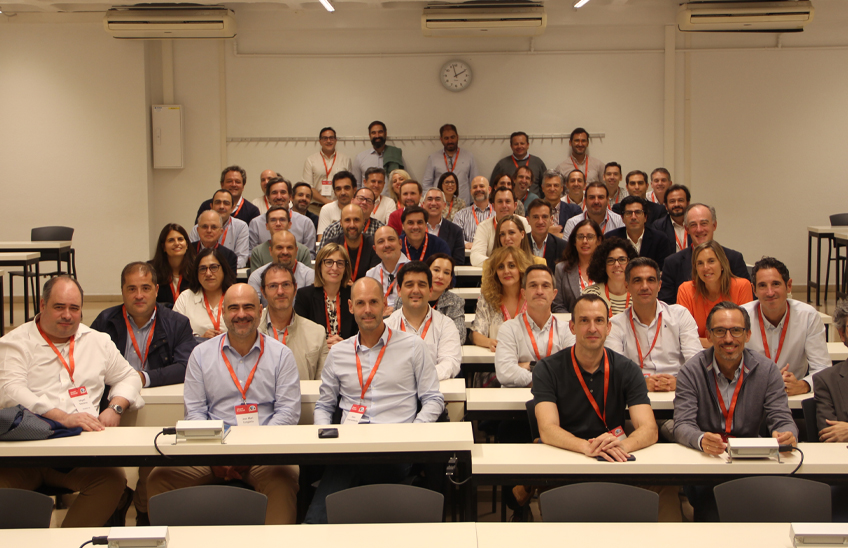Ismael Clemente, CEO of MERLIN Properties: "In today's society there is little financial culture, but it is necessary to understand and live the Economics actively".
More than 200 professionals attended the first meeting Alumni Sectorial of the University of Navarra focused on the Real Estate sector.

07 | 06 | 2024
On Wednesday, June 5, the University of Navarra presented in Madrid its first meeting Alumni Sectorial at partnership with the Alumni Real Estate Club. More than 200 professionals, including alumni and industry professionals, enjoyed the session "Beyond Real Estate" with businessman Ismael Clemente, CEO of MERLIN Properties. With this new proposal the University seeks to foster professional relationships among its alumni and to promote business opportunities that can be created in the sector.
Íñigo Gutiérrez (TECNUN'98 | PHD'04), director of Alumni University of Navarra, was in charge of welcoming and presenting the new sectorial events. This was followed by a discussion with Ismael Clemente and moderated by Sergio Arana (DER'04 | MBA'12).
During the conversation, attendees were able to learn about his career and how he made the professional leap that has turned Ismael Clemente into one of the country's great entrepreneurs. "It is important to always approach life with joy. It is also important to have an iron discipline , to know how to cope with fatality and to have humility. Obviously it also has a cost and you have to be willing to pay it." Clemente also told attendees about the great challenge that his immersion in the field of data centers has brought him. "I am not a digital native, nor am I an engineer." Despite this, he has managed to adapt to this capital-intensive industry, with totally different clients and different challenges than other real estate sectors.
Ismael is currently CEO of MERLIN Properties, a real estate company dedicated to the acquisition and management of commercial real estate assets. He was also able to explain the process of looking for new lines of investment or new strategies.
"In our case it is easy because we had it very worked out from the beginning, we decided to buy quality assets with complete autonomy to execute, both at the origination and execution level as well as the closing of the different transactions. This was in 2014, once the great financial depression had passed, and we saw an unrepeatable opportunity. We bought as many assets as we could and realized that we quickly had to switch to a corporate strategy. With those corporate acquisitions we took a leap and that is when the company started to have other widths. Then we started to put CAPEX into the assets and we started to see that there was a possibility for inflation to be generated in the market and then we had to hurry to deleverage".
On the other hand, Sergio Arana was able to talk to speaker about the role of "vulture or opportunistic" funds in the Spanish market in 2012-2015. According to Ismael, these were difficult times for investment, so these funds allowed to speed up the mass of monetary circulation, which at that time had an almost negative velocity. In addition, they promoted the creation of the Sociedades Anónimas Cotizadas de Inversión Inmobiliaria (SOCIMI). "Opportunistic funds, due to their high cost of capital, eventually create damage to Economics. Therefore, the Government at the time, with very good judgment, realized that the market could not base its entire status solely on those funds and created the SOCIMIs, allowing other players to also enter the scene with another subject of investment strategy."
On this topic, Clemente emphasized the importance of stopping being part of the passive class and having an interest in financial culture. "There are many people who criticized the management of opportunistic funds and SOCIMIs but these elements are the precursors of the Building of the Spanish market. The problem is that in today's society there is little financial culture, but it is necessary to understand and live the Economics actively."
Regarding the current status in Spain, Ismael Clemente commented that there is a bubble due to the "over-demand in two types of product, in Madrid, a noble area, and on the beachfront, very sought-after tourist destinations such as Marbella or Mallorca". This has caused a great gentrification in many areas of the country, but he stressed that "it is a reality given by globalization and we have to get used to it". He was also able to talk about tertiary real estate assets. He stated that "there can hardly be a bubble when prices are already being corrected to adapt to the new reality of rates". Finally, for the businessman it is essential to have a healthier and more industrial industry, in which we bet on the primitive accumulation of own capital. He also added, "in Spain there is no rich capital, which translates into a little nationalization of the centers of business decision making in Spain and, therefore, a low support of national capital to national business initiatives".
To conclude, the businessman wanted to share some keys for those young people who are interested in the Real Estate sector, giving special importance to the specific training . "Attitude is not everything, you have to train, specialize and practice, gain experience. In addition, it is important to have knowledge beyond your field, to be able to ask yourself if you are ready and, above all, to be self-critical".
At the end of the session, attendees were able to continue the conversation and establish new relationships with industry professionals at a networking cocktail party.

